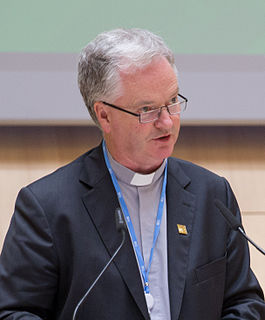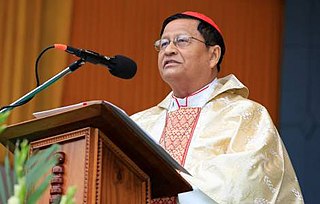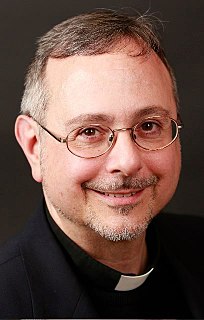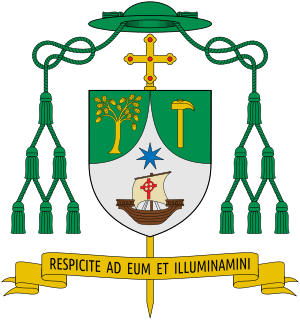Related Research Articles
The Roman Curia comprises the administrative institutions of the Holy See and the central body through which the affairs of the Catholic Church are conducted. It acts in the pope's name and with his authority for the good and for the service of the particular churches and provides the central organization for the church to advance its objectives.

Heythrop College, University of London, was a constituent college of the University of London between 1971 and 2018, last located in Kensington Square, London. It comprised the university's specialist faculties of philosophy and theology with social sciences, offering undergraduate and postgraduate degree courses and five specialist institutes and centres to promote research. It had a close affiliation with the Roman Catholic Church, through the British Province of the Society of Jesus whose scholarly tradition went back to a 1614 exiled foundation in Belgium and whose extensive library collections it housed. While maintaining its denominational links and ethos the college welcomed all faiths and perspectives, women as well as men.
The Pontifical Council for Interreligious Dialogue (PCID) is a dicastery of the Roman Curia, erected by Pope Paul VI on 19 May 1964 as the Secretariat for Non-Christians, and renamed by Pope John Paul II on 28 June 1988.

Michael Louis Fitzgerald is a British cardinal of the Roman Catholic Church and an expert on Christian–Muslim relations. He has had the rank of archbishop since 2002. At his retirement in 2012, he was the papal nuncio to Egypt and delegate to the Arab League. He headed the Pontifical Council for Interreligious Dialogue from 2002 to 2006. Pope Francis raised him to the rank of cardinal on 5 October 2019.

Oswald Gracias is an Indian cardinal of the Roman Catholic Church. He was appointed Latin Church Archbishop of Bombay by Pope Benedict XVI on 14 October 2006 and was raised to the cardinalate in 2007. In 2008, he became vice-president of the Conference of Catholic Bishops of India; and in 2010, he was elected president. He was also elected secretary general and then president of the Federation of Asian Bishops' Conferences from 2010 to 2019. On 13 April 2013, he was appointed to the eight-member Council of Cardinals, informally the Council of Cardinal Advisers, established by Pope Francis to help with governing the Catholic Church and reforming its central administration. He was mentioned as a possible candidate to succeed Pope Benedict XVI in 2013.
Jnana Deepa (JD), Institute for Philosophy and Theology is located at Pune, India. Established by the Jesuits in Kandy in 1893, it was transferred to Pune (India) in 1955. Catering primarily to the formation of candidates to the Catholic priesthood it is run by the Society of Jesus for the education and formation of future Catholic leaders.
P. Antonyraj Sampath Kumar was an Indian New Testament scholar who was the President of the Society for Biblical Studies in India, and was the Escande Chair of Asian Christian Studies at Pondicherry University and was the Chief Warden of the Pondicherry University Hostels. He was a Roman Catholic priest of the Archdiocese of Pondicherry and Cuddalore.
Sara Grant, RSCJ was a British Indologist, Christian missionary, and one of the pioneers of interreligious dialogue in the twentieth century. She came to India in 1956, as a missionary and member of the Religious of the Sacred Heart of Jesus, became actively engaged in interreligious dialogue in India. In time, she became a leading figure in the inculturation movement that was started in India by Roman Catholic priest Fr Richard De Smet, SJ in the early 1970s, with whom she was closely associated with. Her association with Swami Abhishiktananda, further led to working on the Advaita Vedanta (Nondualism) teachings of Hindu philosopher Adi Sankara, as revealed in her spiritual autobiography, Towards an Alternative Theology: Confessions of a Non-dualist Christian (1991).

Paul Tighe is an Irish prelate of the Catholic Church. He has been the Secretary of the Pontifical Council for Culture since his appointment on 28 October 2017. He is the joint highest-ranking Irishman in the Roman Curia, along with Bishop Brian Farrell. He was consecrated a bishop on 27 February 2016. He previously served as adjunct secretary of the same dicastery from December 2015 and as secretary of the Pontifical Council for Social Communications from 30 November 2007. Before that he was director of the Office for Public Affairs for the Dublin diocese.
An ecclesiastical university is a special type of higher education school recognised by the Canon law of the Catholic Church. It is one of two types of universities recognised, the other type being the Catholic university. Every single ecclesiastical university is a pontifical university, while only a few Catholic universities are pontifical.

William Crean is a Roman Catholic bishop in Ireland. He has been the Bishop of Cloyne since 2013.
The John Paul II Center for Interreligious Dialogue is an academic center that serves to build bridges between religious traditions, particularly between Catholic Christian and Jewish pastoral and academic leaders. The Center is a partnership between the Russell Berrie Foundation and the Pontifical University of Saint Thomas Aquinas (Angelicum). It operates as part of the Section for Ecumenism and Dialogue in the Theology Faculty of the Angelicum in Rome.

Charles Maung Bo is a Burmese Catholic prelate who has served as Archbishop of Yangon since 7 June 2003. He was created a cardinal by Pope Francis in 2015.

Father Francis Vincent Tiso is a Catholic priest, scholar, and writer interested in inter-religious dialogue and Tibetan Buddhism. He teaches Tibetan Buddhism at the Pontifical Gregorian University in Rome. He translated several early biographies of the Tibetan yogi and poet, Milarepa and studied the rainbow body phenomenon in Tibet. He has led research expeditions in South Asia, Tibet and the Far East, and his teaching interests include Christian theology, history of religions, spirituality, ecumenism and interreligious dialogue.

Daniel Fernando Sturla Berhouet, SDB is a Uruguayan Roman Catholic prelate and the archbishop of Montevideo.
Bishop James Thoppil is the serving Bishop of the Roman Catholic Diocese of Kohima.

José Tolentino Calaça de Mendonça is a Portuguese prelate of the Roman Catholic Church. A theologian and university professor, he is also regarded as one of the most original voices of modern Portuguese literature and a Catholic intellectual. His work includes poetry, essays and plays that he signs José Tolentino Mendonça.
Linda F. Hogan is an Irish ethicist, ecumenist and academic, specialising in Christian ethics, political ethics, human rights, gender, and ecumenism. She is Professor of Ecumenics at Trinity College Dublin, where she was also its vice-provost from 2011 to 2016. She worked as a lecturer at the University of Chester and University of Leeds before joining the staff of Trinity College, Dublin.

Michael Gerard Duignan is an Irish Roman Catholic prelate who has served as Bishop of Clonfert since 2019 and additionally as Bishop of Galway and Kilmacduagh since 2022.
Dietmar Werner Winkler is an Austrian scholar of patristics and ecclesiastical history. He is a professor and the founding director of the Center for the Study of the Christian East at the University of Salzburg.
References
- ↑ "Institute For The study Of Religion". www.isrpune.org. Retrieved 27 November 2018.
- ↑ "Goethe-Universität — Gastprofessur 2006". www.uni-frankfurt.de. Retrieved 27 November 2018.
- 1 2 Srl, Tecnoinformatica. "Centro Interculturale Raimon Panikkar". www.raimonpanikkar.it. Retrieved 27 November 2018.
- ↑ "Theologie interkulturell aus Indien". Publik-Forum.de. Retrieved 27 November 2018.